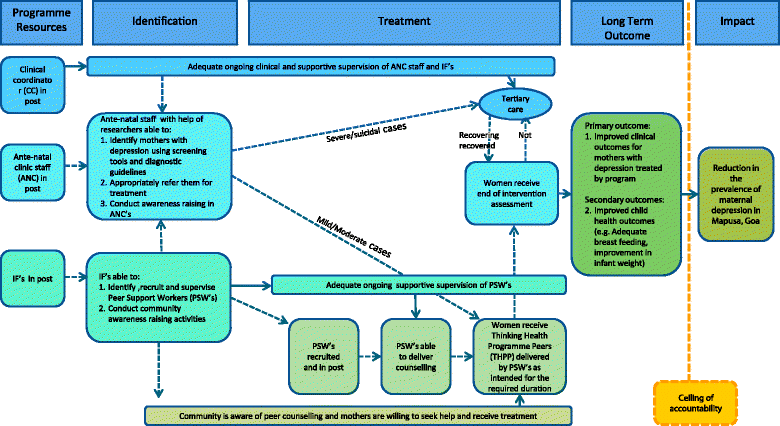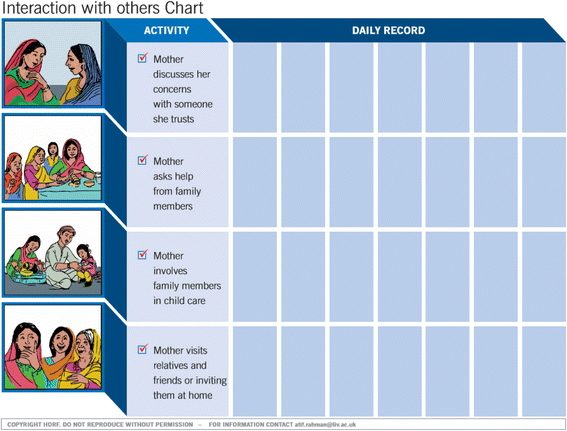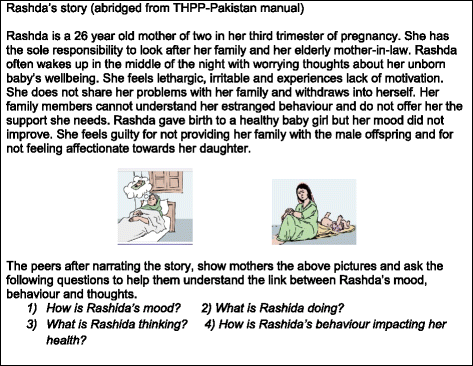Mother-to-mother therapy in India and Pakistan: adaptation and feasibility evaluation of the peer-delivered Thinking Healthy Programme
- PMID: 28231791
- PMCID: PMC5324237
- DOI: 10.1186/s12888-017-1244-z
Mother-to-mother therapy in India and Pakistan: adaptation and feasibility evaluation of the peer-delivered Thinking Healthy Programme
Abstract
Background: Perinatal depression is highly prevalent in South Asia. Although effective and culturally feasible interventions exist, a key bottleneck for scaled-up delivery is lack of trained human resource. The aim of this study was to adapt an evidence-based intervention so that local women from the community (peers) could be trained to deliver it, and to test the adapted intervention for feasibility in India and Pakistan.
Methods: The study was conducted in Rawalpindi, Pakistan and Goa, India. To inform the adaptation process, qualitative data was collected through 7 focus groups (four in Pakistan and three in India) and 61 in-depth interviews (India only). Following adaptation, the intervention was delivered to depressed mothers (20 in Pakistan and 24 in India) for six months through 8 peers in Pakistan and nine in India. Post intervention data was collected from depressed mothers and peers through 41 in-depth interviews (29 in Pakistan and 12 in India) and eight focus groups (one in Pakistan and seven in India). Data was analysed using Framework Analysis approach.
Results: Most mothers perceived the intervention to be acceptable, useful, and viewed the peers as effective delivery-agents. The simple format using vignettes, pictures and everyday terms to describe distress made the intervention easy to understand and deliver. The peers were able to use techniques for behavioural activation with relative ease. Both the mothers and peers found that shared life-experiences and personal characteristics greatly facilitated the intervention-delivery. A minority of mothers had concerns about confidentiality and stigma related to their condition, and some peers felt the role was emotionally challenging.
Conclusions: The study demonstrates the feasibility of using peers to provide interventions for perinatal depression in two South Asian settings. Peers can be a potential resource to deliver evidence-based psychosocial interventions.
Trial registration: Pakistan Trial: ClinicalTrials.gov Identifier: NCT02111915 (9 April 2014), India Trial: ClinicalTrials.gov Identifier: NCT02104232 (1 April 2014).
Keywords: Low and middle income countries (LMIC); Peers; Perinatal depression; Psychosocial interventions; Thinking Healthy Programme (THP).
Figures



References
-
- Wachs TD, Black MM, Engle PL. Maternal Depression: A Global Threat to Children’s Health, Development, and Behavior and to Human Rights. Child Dev Perspect. 2009;3:51–59. doi: 10.1111/j.1750-8606.2008.00077.x. - DOI
MeSH terms
Associated data
Grants and funding
LinkOut - more resources
Full Text Sources
Other Literature Sources
Medical
Miscellaneous

